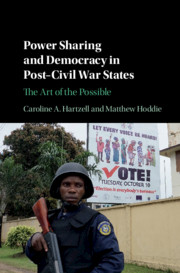Crossref Citations
This Book has been
cited by the following publications. This list is generated based on data provided by Crossref.
Webster, Kaitlyn
Torres, Priscilla
Chen, Chong
and
Beardsley, Kyle
2020.
Ethnic and Gender Hierarchies in the Crucible of War.
International Studies Quarterly,
Vol. 64,
Issue. 3,
p.
710.
Bochsler, Daniel
and
Juon, Andreas
2021.
Power-sharing and the quality of democracy.
European Political Science Review,
Vol. 13,
Issue. 4,
p.
411.
Whitt, Sam
2021.
Ethnic trust, minority status, and public goods in post-conflict societies.
Journal of Peace Research,
Vol. 58,
Issue. 6,
p.
1239.
Cammett, Melani
Parreira, Christiana
Kruszewska-Eduardo, Dominika
and
Atallah, Sami
2022.
Commitment to the “National” in Post-Conflict Countries: Public and Private Security Provision in Lebanon.
Journal of Conflict Resolution,
Vol. 66,
Issue. 7-8,
p.
1235.
Mahmalat, Mounir
and
Zoughaib, Sami
2022.
Breaking the mold? Ministerial rotations, legislative production and political strategies in Lebanon.
Governance,
Vol. 35,
Issue. 4,
p.
1029.
Schulte, Felix
and
Trinn, Christoph
2022.
Self‐Ruleand Intrastate Conflict Risk in Divided Societies: A Configurational Analysis of Consociational Institutions.
Swiss Political Science Review,
Vol. 28,
Issue. 3,
p.
413.
Carey, Sabine C.
González, Belén
and
Gläßel, Christian
2022.
Divergent Perceptions of Peace in Post-Conflict Societies: Insights from Sri Lanka.
Journal of Conflict Resolution,
Vol. 66,
Issue. 9,
p.
1589.
Shesterinina, Anastasia
2022.
Civil war as a social process: actors and dynamics from pre- to post-war.
European Journal of International Relations,
Vol. 28,
Issue. 3,
p.
538.
Bayer, Reşat
and
Kemahlıoğlu, Özge
2023.
Democratic Backsliding, Conflict, and Partisan Mobilisation of Ethnic Groups: Local Government Control and Electoral Participation in Turkey.
South European Society and Politics,
Vol. 28,
Issue. 1,
p.
19.
Schulte, Felix
2023.
Frieden durch Selbstbestimmung.
p.
1.
Farag, Mahmoud
Jung, Hae Ran
Montini, Isabella C.
Bourdeau de Fontenay, Juliette
and
Ladhar, Satveer
2023.
What Do We Know about Power Sharing after 50 Years?.
Government and Opposition,
Vol. 58,
Issue. 4,
p.
899.
Mahmalat, Mounir
Atallah, Sami
and
Maktabi, Wassim
2023.
Resource allocation in power-sharing arrangements – evidence from Lebanon.
Third World Quarterly,
Vol. 44,
Issue. 3,
p.
554.
Fakhoury, Tamirace
and
McCulloch, Allison
2023.
How Do Consociations Craft Asylum Policy? Lebanon’s Response to Conflict-Induced Displacement as an Exploratory Case.
International Studies Quarterly,
Vol. 67,
Issue. 3,
Gurses, Mehmet
and
Mason, T. David
2023.
Civil War Outcomes and Egalitarian Democracy in Post-Civil War States: A Cross-National Analysis, 1946-2018.
Defence and Peace Economics,
Vol. 34,
Issue. 4,
p.
437.
Savun, Burcu
Stanton, Jessica A
Hartzell, Caroline A
and
Reid, Lindsay
2024.
Violence beyond the Battlefield: Civilian Targeting, Sexual Violence, and Women’s Political Empowerment.
Journal of Global Security Studies,
Vol. 9,
Issue. 1,
Gurses, Mehmet
and
Çelik, Ayşe Betül
2024.
Settling Softly: Ending War and Making Peace in Divided Societies.
International Interactions,
Vol. 50,
Issue. 4,
p.
624.
Hartzell, Caroline A.
Hoddie, Matthew
and
Page, Douglas
2024.
Civil War Settlements, Perceived Agreement Fairness, and Trust in Political Authorities: Investigating the Influence of Power Sharing on Public Opinion in Divided Societies.
Journal of Conflict Resolution,
Vol. 68,
Issue. 7-8,
p.
1552.
Carey, Sabine C
Gläßel, Christian
and
Paula, Katrin
2024.
Media impact on perceptions in postwar societies: Insights from Nepal.
Conflict Management and Peace Science,
Schulte, Felix
and
Carolan, Gene
2024.
What’s Law Got to Do with It? How the Degree of Legalization Affects the Durability of Post-Conflict Autonomy Agreements.
Ethnopolitics,
Vol. 23,
Issue. 4,
p.
409.
Hartzell, Caroline A.
2024.
Power-Sharing in the Global South.
p.
17.



